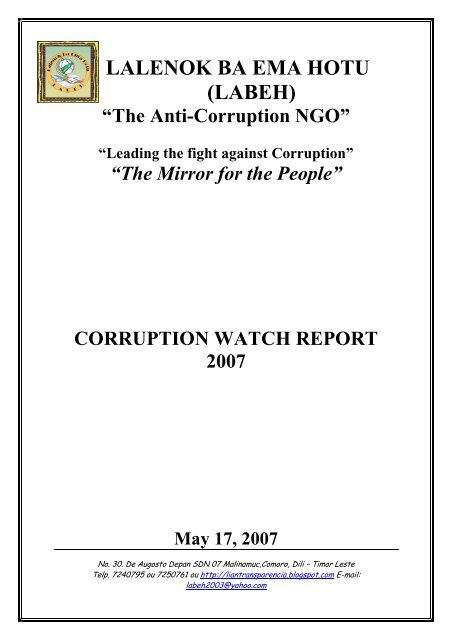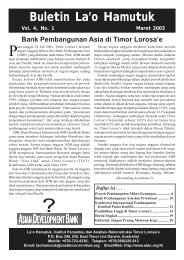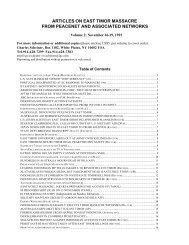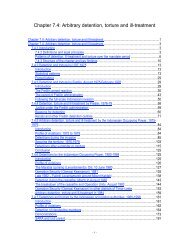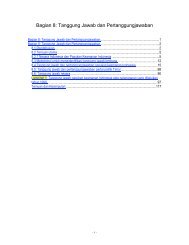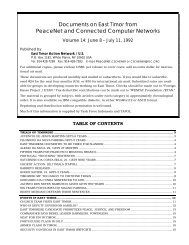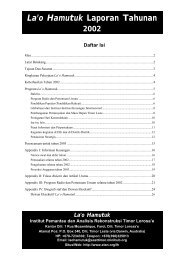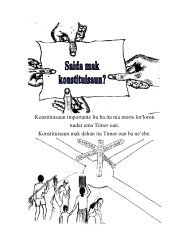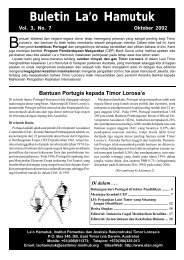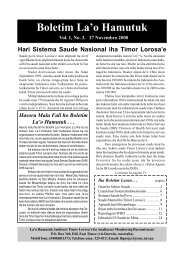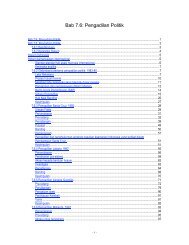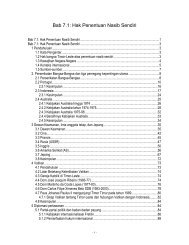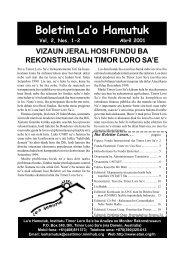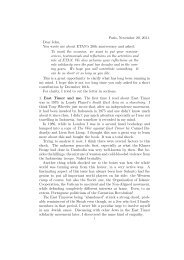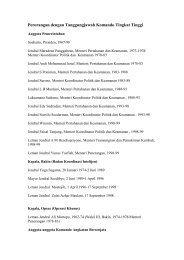lalenok ba ema hotu (labeh) - East Timor & Indonesia Action Network
lalenok ba ema hotu (labeh) - East Timor & Indonesia Action Network
lalenok ba ema hotu (labeh) - East Timor & Indonesia Action Network
You also want an ePaper? Increase the reach of your titles
YUMPU automatically turns print PDFs into web optimized ePapers that Google loves.
LALENOK BA EMA HOTU(LABEH)“The Anti-Corruption NGO”“Leading the fight against Corruption”“The Mirror for the People”CORRUPTION WATCH REPORT2007May 17, 2007No. 30. De Augosto Depan SDN 07 Malinamuc,Comoro, Dili – <strong>Timor</strong> LesteTelp. 7240795 ou 7250761 ou http://liantransparencia.blogspot.com E-mail:<strong>labeh</strong>2003@yahoo.com
MessageDear friends of LABEH,LABEH takes its roots and initiative from the Constitution of <strong>Timor</strong>-Leste Section 43(Freedom of Association) and the <strong>Timor</strong>-Leste National Development Plan, (Our Vision forDemocracy and Good governance) what people say Civil society can do? “Monitor theactivities of government (including the civil service) politicians and private sector, andinform the people on their economic, social and environmental impact”.The fundamental motivating force behind all the activities of Lalenok Ba Ema Hotu(LABEH) is the Gospel of Jesus Christ as it pertains to the alleviation of human suffering, thedevelopment of people and the fostering of love, human dignity, economic and social justice,transparency, accountability, fighting corruption, and promoting justice.We have been able to accompany the growth of our new nation and especially in supportingthe development process of our country and demonstrating solidarity with our government inits quest to promote transparency, accountability, and economic justice and com<strong>ba</strong>tingcorruption in perfect harmony with the first Constitutional government led by Dr. MarieAlkatiri in it’s efforts towards “Zero Tolerance against Corruption” and in the secondConstitutional government led by Dr. Jose Ramos Horta in it’s efforts to promote “GoodGovernance” in the government administration.It is in this struggle to fight corruption and promote transparency and accountability thatLABEH encountered great challenges by the forces that are against transparency,accountability and economic justice. LABEH was questioned by the National police of<strong>Timor</strong>-Leste (PNTL) for a defamation case brought against us by a member of the formergovernment led by Dr. Marie Alkatiri, because of our report on corruption, some topgovernment Ministers has threatening to charge LABEH to court in a number of incidents asreported in the national media, but these threatening only made us to become stronger in ourcrusade and campaign on the fight against corruption.As we have so effectively demonstrated to our people, our capacity to provide criticalinformation on the issues of corruption, and the political and social development in ourcountry and the pursuit of transparency and accountability in the government proceedings arebeyond reproach. Therefore, we will continue our work and provide support to all efforts tocom<strong>ba</strong>t corruption and towards sustainable development and economic justice.Since 2003 LABEH has accomplished much and is recognized as the leading NGO focusingon fighting corruption at the national level. However, corruption still distorts political,economic and social life and as LABEH grows and continues its fight against corruption, newchallenges open up. The issue of ethical behavior and accountability within the governmentof <strong>Timor</strong>-Leste has become the focus of attention in the resent years, triggered as muchincidents of mismanagement and corruption within a small number of government officersand Ministries.LABEH Corruption Watch Report 2007 provides an overview of the state of corruptionwithin the government of <strong>Timor</strong>-Leste for the period from 2002 to 2007. “LABEHCorruption Watch Report 2007” focuses on the general observations of LABEH aboutcorruption in the government starting from independence to this present time.2
The challenge facing the new government now would be to create a system of governancethat promotes supports and sustains human development. Sound governance taken a stepfurther is a subset of governance wherein public resources and problems are managedefficiently and in response to the critical needs of society. Effective democratic forms ofgovernance rely on public participation, accountability and transparency. Publicaccountability covers the spectrum of approaches and practices used by government to ensurethat activities and output meet the intended goals and standards.Our National Development Plan (NDP) in page 42 stated about Government and Governanceit says “The <strong>Timor</strong>ese government, private sector and civil society will need to acquire newknowledge and develop new skills to administer a modern nation state, and build a morediverse, developed economy.” Capacity development for governance and public sectormanagement program outlined and suggested 75 areas of development, implementation ofwhich was regarded as important for institutional and human resource development.In almost these five years of our independence, much has been accomplished, and we cancertainly be proud of the achievements made by our government, but as we all know, there isalso much still left to do. Let us not forget that in this task of building a nation and creatingState institutions, it is only natural that we will continue to be facing with challenges; a majorone, that of good governance and com<strong>ba</strong>ting corruption and instilling a culture oftransparency and accountability in the government and in the civil society.Let us not forget that we are walking through a cross roads of changing the mindset of peopleor mentalities from the lack of diligence to assuming responsibility of duties. Let us notforget also that our country is faced with huge poverty, a major cause for corruption.Corruption destroys the whole society and it is not part of our <strong>Timor</strong>ese culture and it needsto be dropped.In <strong>Timor</strong>-Leste vision for 2020, our people realized that without transparency, goodgovernance and a strong policy on com<strong>ba</strong>ting corruption, our vision will not be achieved.This is the reason LABEH’s determination in promoting good governance and promotingtransparency and fighting against corruption in the state administration is inevitable, and weurge our government to be firm in it’s determination to com<strong>ba</strong>t corruption.We are profoundly convinced that the threats, which face us, are of equal concerns to all. Wehave called this report “LABEH Corruption Watch Report 2007” because we believe that in anation of inter-connected threats and opportunities, it is in the interest of our country that allof these challenges are addressed effectively. The fight against corruption can only beadvanced if our administrative organs and public servants work together with the Stateinstitutions charged to fight against corruption.The main message of this report is that the objective of the state on strengthen accountabilityand transparency can be achieved, but only if the Government and all the administrativeorgans and the public servants abide in their duties to implement the good governanceprocedures. We urged all the organs of the State to implement the recommendations of theCommission of Experts from the UN, the World Bank, UNDP, Transparency Internationaland the government of Finland on “strengthening accountability and transparency in <strong>Timor</strong>-Leste” and collaborate with the Ombudsman for Human Rights and Justice and the StateInspector General to achieve the goals of good governance, transparency, accountability andcom<strong>ba</strong>ting corruption.3
We can not speak of good governance, corruption, transparency and accountability withoutmaking mention of the Office of the Prosecutor General and the Judicial System. We areconcerned that cases related to irregularity and corruption submitted to the Office of theProsecutor General by the State Inspector General and the Ombudsman for Human Rightsand Justice has r<strong>ema</strong>ined in that office without any legal proceeding known to the public inregards to the same. We specifically acknowledge the efforts of the Office of the InspectorGeneral and the Provedor for conducting investigations; inspections and special examinationsin public administration, though, non-of their recommendations has changed the mentalitiesof those “Caught up in corruption trap”Therefore, we ask the Prosecutor General to improve his services to the nation and to thepeople, uphold the rule of law, com<strong>ba</strong>t corruption and adopt speed approach to respond tocases of corruption and publicly announce what actions has been taking in regards to casesrelated to corruption, collusion and nepotism.However, to ensure good governance, transparency and accountability in the stateadministration, the Ombudsman for Human Rights and Justice and the Government mustadopt an inclusive approach to making space for civil society, more especially NGOsworking on anti-corruption and human rights to play their full role. The challenge in fightingcorruption and abuses of human rights is too big for the government and the Ombudsman toface it alone.In conclusion, our profound gratitude goes to Dr. Jose Ramos Horta, the President Elect andthe Prime Minister of <strong>Timor</strong>-Leste for supporting LABEH in its activities of fightingcorruption and also to the Government of Finland through its Em<strong>ba</strong>ssy in Jakarta for assistingLABEH.Lalenok Ba Ema Hotu (LABEH) reiterates its commitment to raising awareness on thecritical information on public issues and to provide information on political development in<strong>Timor</strong>-Leste to hold the government to honor its commitment on transparency andaccountability in State affairs, to com<strong>ba</strong>t corruption and renew efforts towards a drastic andcontinuous reduction of poverty in our country.We believe that LABEH will continue to be the leading national NGO in the fight againstcorruption and to pioneer the campaign of the civil society’s role in fighting corruption and topromote other activities related to our vision and mission.Finally, On behalf of LABEH and staff, we thank you all and looking forward for yourcontinuing support on the activities of LABEH.Thank you! And may God bless us all.Dr. Christopher Henry SamsonExecutive Director LABEH4
IntroductionThe goal of this “Corruption Watch Report 2007” is to inform and influence polices to reducethe scale and incidence of corruption in the government administration of <strong>Timor</strong>-Leste. It isto strengthen our Government bid to “Good Governance and Accountability” and for zerotolerance against corruption for effective governance reform.There are many factors that provide particular opportunities for corruption. While <strong>Timor</strong>-Leste may share many of these characteristics of week and poor governance, there are bothspecial problems and potential opportunities for reform that deserve particular attention. Anunderstanding of the types of corruption in our government is essential to inform and rethink/on how to develop models that may be used by the government to fight against corruption in<strong>Timor</strong>-Leste.The events of 1999 and the flood of aid and the creation of wholly artificial and unsustainableeconomy coupled with the destruction of infrastructures has created conditions in whichcorrupt interest have been able to divert much of the <strong>ba</strong>dly needed funds to private ends. Theperceived absence of integrity in our government severely weakens the credibility of ourdemocratic institutions. Improving integrity or developing and implementing strategies forprevention and control of corruption is an integral part of ensuring accountability.Corruption in the government ministries results in the misuse of the scarce resources thatgreatly affects the entire economy. Particularly in the areas supported by external assistance,corruption can devalue the reputation and efforts of national and international developments.Extensive research has been done both academically and through interviews by LABEH onthe issues of corruption in <strong>Timor</strong>-Leste in our efforts to advocate for anti-corruption and inpromoting transparency and accountability in the public administration.“The issues of corruption were largely ignored during the first Constitutional government ledby Dr. Mari Alkatiri. There was no single case of corruption brought to court talk less ofanyone been convicted during the first Constitutional government”. Though there wereefforts made to strengthening accountability and transparency in the first Constitutionalgovernment but there was no sustainable in-dept work of a comparative nature done on theissue. “But in the second Constitutional government led by Dr. Jose Ramos Horta, the issueof corruption began to receive the attention that it needs due to there are 12 cases ofcorruption now submitted to the office of the Prosecutor General for legal proceedings”.LABEH Corruption Watch Report 2007 provides information on the recent experiencesacross a wide range of incidences of corruption in <strong>Timor</strong>-Leste; so as to inform the civilsociety on the issues of corruption and to encourage the State Inspector General and theOmbudsman for Human Rights and Justice to draw lessons from these experiences, for theimplementation of standards that can curb corruption and strengthen the rehabilitation ofintegrity in our Government institutions.The aim of LABEH Corruption Watch Report 2007 is to share lessons learned during thesefirst 5 years of our government administration and to inform the attitude of governmentofficials in regards to the issues of corruption so that the next government could developpolicies to counter them, and provide dipper understanding of the governance issues at stake,to implement a new strategy to fight corruption in the government.The government needs to form an Independent Commission consisting of well establishedcitizens empower them to act as a watchdog in conducting oversight control to strengthen the5
existing office of the State Inspector General and the Ombudsman for Human Rights andJustice which will be under the Prime Minister or the President of the Republic.The recent news of corruption was raised in the National Parliament by someParliamentarians in report of activities of the National Parliament, which was dismissed bythe President of the National Parliament Mr. Francisco Guterres “Lo-Lo”. These wentwithout any inspection from the State Inspector General Office. In just few weeks after thatthe National Police of <strong>Timor</strong>-Leste (PNTL) discovered fortification of driving licensesalleged issued by the Transport Department this also went without any legal action known tohave been taken.The former Minister of Interior Rogerio Tiago Lo<strong>ba</strong>to acknowledged there was corruption inthe Police Immigration and in the Border Police Unit (BPU). The former Prime MinisterMari Alkatiri responding to reporters on the issue of corruption as was reported by the formerMinister of Interior Rogerio Lo<strong>ba</strong>to that there was corruption in the Police Department. Saysthat “the population should present him with evidence if found that a member of thegovernment was involved in corruption” the former Prime Minister also did not claim thatthere was no corruption in the government. The former Vise Minister for Public Works Mr.Cesar V. Moreira was alleged of corruption but this was dismissed when the former InspectorGeneral classified it as “Mismanagement of Funds”. Recently the third Vise Prime Ministerand also the Minister for Health Dr. Rui Maria de Araujo publicly denounced and rejected therecommendations from the Provedoria dos Direitos Humanose e Justica on the case ofcorruption involving a staff member of the Ministry of Health.All this confuses our attempt to understand the government commitment in fightingcorruption in the Government administration. This also left doubts in our minds on theseriousness of the Government in its determination for “Zero Tolerance against Corruptionand to promote good governance and accountability”.In LABEH’s view these attitudes from the leaders on the issues of corruption contradicts theGovernment own commitment towards zero Tolerance against Corruption and to promotegood governance and accountability as those officials engaged in corrupt activities do notusually sign document for corruption. We believe that such statements from the former PrimeMinister may weaken the opportunity of the whistle blowers to inform of corrupt practices inthe government. LABEH believes also that the report from the former Minister of Interiorcould constitute an action for investigation by the Inspector General Office or the Provedor toprove the government commitment towards zero tolerance against corruption.Obtaining evidences for corruption such as receipts, invoices, and any other kind of originalrecords is a hard task, though this is important in the court of law. However, in a case wheresuch evidences or record to prove the fact is not available, yet investigations had to rely onsubjective hearings or testimonies from the concerned person or group who reported the case.6
Executive SummaryAvailable data point to challenges ahead. We should not give a single chance for corruptionin the government administrations. We are the poorest country in Asia, with an averageincome of US$478 per person per year; more than 40% of our people survive on less than 55cents a day. Social and economic problems has marked our nation and making it difficult tomeasure the progress of the government, we are also faced with huge developmentchallenges, with about half our population lacking on a formal education, high youthsunemployment and most of our people living beyond the poverty line.However, since there have been indications of corruption in government administration, asreported by the Office of the State Inspector General, (OIG), and the Provedoria dos DireitosHumanose e Justica (PDHG), including NGO LABEH. Corrupt activities have beenidentified in Ministry of Planning and Finance, customs, public procurement, governmentrecruitment processes, Public Works, National Police, Immigration, Ministry of Education,Ministry of Health, Ministry of State Administration, Ministry of Justice, Ministry of Laborand Solidarity, Ministry of Foreign Affairs and Corporations, Ministry of Development andthe Prime Minister’s Office to mention but a few. Thus, corruption reduction and preventionmeasures need to be addressed as a national priority.However, the sustainability of such efforts will heavily depend on the formulation andexecution of enforceable domestic anti-corruption policies. “Establishing the HighAdministrative, Tax and Audit Court as enshrined in our national Constitution and ratifyingUN convention against Corruption would be a testimony to this commitment”. It is alsoimportant that the government recognize the need for the civil society’s involvement inmonitoring corruption as an independent watchdog. The engagement of the civil society, andthe private sector at large, is critical in this struggle. The civil society is particularlyimportant, <strong>ba</strong>rring any conflict of interest, to serve as an independent oversight body, whichwould lend significant credibility to the government’ s effort towards com<strong>ba</strong>ting corruption.Corruption is a symptom of something gone wrong in the management of the state.Institutions designed to govern the relationships between citizens and state is used instead forthe personal enrichment of public officials and the provision of benefits to the corrupt.Corruption is at most a second best response to the failure of the first Constitutionalgovernment led by Dr. Mari Alkatiri, at worst it was a highly distortionary method of publicchoice. Corruption restricts investment and holds <strong>ba</strong>ck economic growth, it underminesprograms designed specifically to aid the poor. The poor are harmed by systemic corruption,but the causes of poverty seem more fundamental and deep-seated. It is difficult to documenta simple relationship between the distribution of the national wealth and the level ofcorruption in <strong>Timor</strong>-Leste.Furthermore, in a state without any social safety net like <strong>Timor</strong>-Leste where there are feweconomic opportunities for the very poor, the bribes collected by civil servants can perform aredistributive function, albeit one that is very inefficient and inequitable. Poor families thathave relatives in the government benefit, while others are made worse off.LABEH Corruption Watch Report 2007 identifies ministries and departments indicated forindication of corruption, mal-administration, abuse of authority, financial fraud, misuse anduneconomical use of public goods and procurement fraud and lack of internal controlenabling individuals to seek their own personal benefits.7
This LABEH Corruption Watch Report 2007, informed by over four years of consultationswith the civil society, NGOs, civil servants, political parties and policymakers in our NationalParliament that;(a) Corruption in the wide sense of the abuse of entrusted power,(b) That systemic corruption can contribute to fatally de-legitimize nascent publicinstitutions and the rule of law.(c) That there is potential for corrupt practices within the public administrationWe interviewed public servants, members of parliament, lawyers, business people, membersof the civil society, and members of NGOs, school teachers, police, customs andimmigration. We noted during interviews with public servants that poor salaries of the publicservants is one of the factors for corruption as the salaries paid by the government to thepublic servants are not enough to meet the public servants needs. We noted that in somecases, decisions was taking on the particular individuals own authority in many cases of maladministrationand abuse of authority. It is lack of personal integrity of the individualconcerned. We also monitored some processes in the administration of the governmentservice delivery in some government ministries and departments.LABEH seek to uncover empirical evidence related to the impact and origins of corruption inthe country. Inform the policy de<strong>ba</strong>te on corruption and advocate for the urgently neededreappraisal and reform of current practices. Implement key standards and innovations toindependently monitor corruption and its effectiveness.8
State Organs fighting CorruptionProvedor de Diretus Humanus e Justisa:The Law Approving the Statute of the Office of the Ombudsman for Human Rights andJustice, taking into account section 27 of the National Constitution, was enacted and cameinto force on 26 May 2004. The National Parliament in 2005 appointed the Ombudsman forHuman Rights and Justice (Provedor de Diretus Humanus e Justisa) this office has alsoreported that there are indications of corruption in the state institutions and have alsosubmitted some cases of corruption to the Prosecutor General for prosecution, but this officehas being under funded by the government making it difficult for this office to really com<strong>ba</strong>tcorruption with no adequate finance and human resources.This office seems to be dedicating most of its energy on the mandate of human right and hasdone very little to the other two mandates of fighting corruption and good governance; thishas raised the question if the Provedor could really fight corruption or just to protect thosegovernment officers caught up in corruption trap and this has made a lot of people starting toloses faith in the office of the Provedor. Note: (This office may not do a lot as there is nolegislation supporting the execution and control of corruption cases).Prosecutor General and the Judicial System:The Office of the Prosecutor General and the Judicial System is the state organ forprosecution of crimes including corruption and mal-administration; it could also assist inpromoting good governance, transparency and accountability, but there are concerns thatcases related to irregularity and corruption submitted to the Office of the Prosecutor Generalby the Inspector General and the Provedor has r<strong>ema</strong>ined in that office without any legalproceeding known to the public in regards to the same. The Prosecutor General needs toimprove his services to the nation and to the people, uphold the rule of law, com<strong>ba</strong>tcorruption and adopt speed approach to respond to cases of corruption and publicly announcewhat actions has been taking in regards to cases related to corruption, collusion and nepotism.Note: This office lacks prosecutor’s specifically delegated authority to prosecute cases ofcorruption and mal-administration).Government organ fighting CorruptionState Inspector General:The budgetary and financial management systems set up with the government are considered“A state of the art”, but the State Inspector General has reported on substantial investigationsinto corruption many of which related to nepotism in appointment to civil service positions.The office of the State Inspector General created on July 2002, is a unique investigatingfunction and was part of the first constitutional structure of the government of <strong>Timor</strong>-Lestewithin the direct observation of the Prime Minister, commissioned to observe and investigateissues of corruption, mal-administration, audit, abuse of power/authority, <strong>ba</strong>d behavior andmismanagement of funds. In addition, to recommend actions to be taking to strengthen th<strong>ema</strong>nagement of the state administration, in a few general investigations and inspectionsconducted by the office of the State Inspector General found that there were indications ofcorruption in the government departments, committed by some government officials.Note: (this office lack much human resource adequate to carry inspection in all thegovernment institutions and it is also important to note that the organic law of thisoffice has not being approved by the government.)9
These three intuitions have never gained the trust of the people. The people are so pessimiston where to look for Justice. Justice is also very slow and even in civil cases, judges do notpay real attention, these issues are very harming to the nation. For example, the third VisePrime Minister and also the Minister for Health Dr. Rui Maria de Araujo publicly denouncedand rejected the recommendations from the Provedoria dos Direitos Humanose e Justica,making it difficult for the people to trust the office of the Provedor. There was also a debt anddeception case by a foreign businessman, and a national lawyer requested to the ProsecutorGeneral office and the investigating judge to order the immigration to cancel all journeys toprevent the defendant or the debtor from leaving the country, but in reality, the debtor left thecountry, this again making it impossible for people to trust the judiciary system in thecountry.Civil SocietyAnother difficult situation is the nonexistence control of the State Institutions from the civilsociety in the administration of the state affairs in <strong>Timor</strong>-Leste, especially the procedure andthe implementation of regulations concerning government service delivery for the people.The civil society control is vital and important to create a <strong>ba</strong>lance among existing governmentinstitutions to monitor the execution of the government programs.National MediaThe media needs to be strengthened, more capacity development is also needed for our localmedia to be trained in investigative journalism, it is accepted principle that effective andindependent media is a pillar for good governance, ensuring access to information andfreedom of speech. Clarification on media law would help to ease the confusion that currentlyexists in our country, and strengthen media’s participation in com<strong>ba</strong>ting corruption. Access toinformation is also critical to ensuring public participation. Adopting a Freedom ofInformation Law as enshrined in our National Constitution would be a step in the rightdirection. It provides for accountability to the people on actions taken by the Government,such as public expenditure.DonorsThe donors’ need to recognize the need to fund civil society’s monitoring corruption as anindependent watchdog. Civil society is also important for linking reform measures to theaspirations and expectations of the people. The engagement of the civil society, and theprivate sector at large, is critical in this struggle. “But for this to occur, civil society needsto be funded and to be strengthened”. The NGOs are particularly important, <strong>ba</strong>rring anyconflict of interest, to serve as an independent oversight body, which would lend significantcredibility to the Ombudsman for Human Rights and Justice and the state Inspector General’sefforts towards “fighting Corruption”.Donor agencies such as the World Bank, UN, UNDP, USAID and some few others in <strong>Timor</strong>-Leste usually fund government intuitions such as the State Inspector General and theProvedor on anti-corruption, making it difficult for NGOs to get fund necessary needed toacquire the necessary capacity and experiences needed in acting as a watchdog to the act ofcorruption, as there is no visible corporation on training between the state institutions and theNGOs on anti-corruption and good governance, though there has never being any significantprogress made by these intuitions to crop corruption or change the mentalities of thosegovernment officers caught up in corruption trap, in the other hand the donors has done littleto fund anti-corruption initiatives by NGOs dedicated in the fight against corruption in<strong>Timor</strong>-Leste.10
Lalenok Ba Ema Hotu (LABEH)In 2003 LABEH started its campaign to fight against corruption. The organization hasaccomplished much during its first 4 years and is recognized as the leading NGO in <strong>Timor</strong>-Leste focusing on fighting corruption in the national level.However, as LABEH grows and continues its fight against corruption new challenges openup. LABEH has identified the strategic directions for the organization for the next three tofives years, LABEH has undertaken a process of strategic planning. This “Corruption Report2007” is the result of that process.Consultations within the <strong>Timor</strong>ese society and with external stakeholders have helpedLABEH to define the following vision and mission for LABEH.• LABEH’s Vision is the prosperity of the people through a cleangovernment;• LABEH’s Mission is to hold the government to carry out to it’spromises on transparency and accountability;Fighting corruption:• Reduces poverty and diminishes social injustice• Builds democracy and open government• To encourage the government to eliminate economic disparity and to com<strong>ba</strong>tcorruption and poverty.• To be active in the struggle to com<strong>ba</strong>t corruption and promote transparency andaccountability;• To coordinate, facilitate research and publish the results.The challenges that LABEH faces are:• Keeping corruption on the top of national agendas by the competent authorities.• Maintaining our reputation as the leading NGO fighting against corruption.• Securing trust of the competent authorities in our country.• Capacity building of LABEH staff.• Securing funds to implement our program activities.In order to achieve our vision and implement our mission LABEH will build on particularcapabilities:• Clear focus on corruption.• National and international expertise through extensive network and individualcollaborators and,• Ability to mobilize national and international individual expert’s specialists to assistin our work.11
General Observations in some Government Ministries and Departments:Our findings as the root cause of mal-administration, abuse of authority, misuse of publicfacilities, corruption and financial fraud could be classified as;1. Lack of capacity of most civil servants to interpret the law and the governmentregulations;2. Lack of information about all regulations of the government to deliver their servicesto the people;3. Lack of cordial coordination in the internal system among the inter ministries anddepartments;4. Excessive concentration of authority delegated to one particular individual oradministration.5. Lack of constant improving the knowledge of the public servants about the rule of lawand good governance in public administration by regular training on civil service actand regulations of the government.6. Lack of enforcing the implementation of government regulations to promote goodgovernance,General Observations of mal-administration and corruption in the government:The types of corruption experienced in the government ministries and departments are mostlyfinancial fraud including irregularities in salary payments, falsification of invoices,mismanagement of fund, uneconomical use of fund, lack of transparency in some recruitmentprocesses of the civil servants, procurement fraud. The circumstances behind this kind ofcorruption include favoritism, falsification of documents and unclear or inadequate selectionprocesses.Another category is abuse of authority, we found bribery cases in some observations due tolack of personal integrity in some civil servants, some custom officers received bribes tospeed up the checking of customs procedures. Some immigration police officers also receivebribes to extend visas for foreigners; Procurement process is one of the most vulnerabledepartments in which corruption flourishes. What is the most striking of our observation inthis department is that sometimes there were no tenders or completive bid in the course ofpublic procurement without any justifiably reasons. In this category, we noticed theconcentration or centralization of power of decision-takings in the central organ ofadministration or an individual.The excessive concentration of authority in the hand of one particular individual oradministration can be especially identified in the negotiation of purchase of goods andservices, public works and recruitment process. As a result, there is a large personaldiscretion in conferring powers; the decisions some times are taken on the particularindividual’s own authority in many cases. It is also common features that there is no or littleinternal control or external control mechanisms. Even if administrative operative regulationsexist, there are gaps or omissions between the regulations and the implementations.Finally, the private use of public facilities such as: telephone, computers, governmentvehicles, fuel are identified in many ministries and departments. In LABEH’s view, thecauses of this category are characterized by absence of adequate, effective and efficientinternal control measures; as a result, those public facilities are used for personal benefitinstead of public benefit.12
Observations carried out by LABEH and reported to State Inspector General andProvedoria dos Direitos Humanose e Justica for investigation from the period 2003-2007No Ministry Activity Subject Requested forinvestigation1. Ministry of Request investigation Lack Financial Fraud Stateplanning and of public tenders, in the (Uneconomical InspectorFinance rehabilitation of Council use of money) Generalof Ministers meetingRoom2. Ministry of Request investigation Financial Fraud Stateplanning and Boarder Officers receive (Uneconomical InspectorFinance bribe to allow illegal use of money) Generalgoods to enter into thecountry3. Ministry of Request investigation Tax Financial Fraud Stateplanning and and Revenue officers (Uneconomical InspectorFinance receive bribe from use of money) Generalbusinessmen4. Ministry of Request investigation Abuse of Stateplanning and Minister/Vice Minister Authority InspectorFinance sends recommendation toGeneralaward contacts without adue process.5. Ministry of Abuse of Human right and Abuse of StateJustice Mal administration Authority InspectorGeneral6. Ministry of Audit in the Becora Prison Financial Fraud StateJustice(Uneconomical InspectorMinistry of7. Education,Youth and Sport8. Ministry ofJustice9. Ministry ofPublic Works10. Ministry ofHealth11. Ministry of StateAdministrationIrregularity of salarypayments to TeachersRehabilitation of theJudge’s house in OecussiDistrictRehabilitation of Becoraand Comoro marketsRequest investigation ofFraud in the NationalHospital of DiliInvestigation ofirregularity in recruitmentprocessRequest audit in BecoraPrisonuse of money)Irregularity ofsalary paymentsFinancial Fraud(Uneconomicaluse of money)Financial Fraud(misuse ofmoney)Financial Fraud(Falsification ofInvoice)RecruitmentfavoritismGeneralStateInspectorGeneralStateInspectorGeneralStateInspectorGeneralStateInspectorGeneralStateInspectorGeneralComplainantLABEHLABEHLABEHLABEHLABEHLABEH2003LABEHLABEHLABEHLABEHLABEH12. Ministry ofFinancial Fraud State LABEHJustice(misuse of Inspectormoney)Generalprocurement13. Ministry of Request investigation on Irregularity in the State LABEH13
Education14. Ministry ofJustice15. Ministry ofTransportation/Ministry ofFinance16. Ministry ofTransportation/Ministry ofFinance17. Ministry ofFinance18. Ministry ofTransportation19. Ministry ofTransportation20. Ministry ofTransportation21, Ministry ofInterior22. Ministry ofDevelopment23. Ministry ofDevelopmentaward of the project “UmaFukum” Cultural CenterProcurementprocessRequest investigation Abuse ofdirection of Registration Authority Powerand Notary process (Bribery)Request investigation Financial Fraudabout the use and (uneconomicalmaintenanceof use of money)government vehiclesRequest investigation Fuel theftabout the use and (uneconomicalmanagement of useofgovernment fuelgovernment fuel)Request Audit on Customs Abuse ofAuthority power(Bribery),financial FraudRequest investigation intofuel lost in transport fromDili to UatulaliRequest investigationEDTL civil servants in thedistrict of Bobonaro salegovernment fuel forelectricity to drivers forprivate use and personalpurposes.Request investigationSome civil servants issuefalse licenses tocustomers/clients andreceive kick <strong>ba</strong>cks toregister old vehicle,Request investigationBorder Control Police atBatugade border receivebribe from business peopleto enter illegal goodsRequest investigation ondelaying the services to theprivate sector and makingquick services whenprivate sector gives someincentives to staffRequest investigation onirregular treatment ofbusiness registration(Embezzlement)Fueltheft(uneconomical use ofgovernment fuel)Fueltheft(uneconomical use ofgovernment fuel)Abuse ofAuthority power(Bribery),financial Fraud(Embezzlement)Abuse ofAuthority power(Bribery),financial Fraud(Embezzlement)(Bribery),financial Fraud(Embezzlement)Abuse ofAuthority power(Bribery),financial Fraud(Embezzlement)InspectorGeneralStateInspectorGeneralStateInspectorGeneralStateInspectorGeneralStateInspectorGeneralStateInspectorGeneralStateInspectorGeneralStateInspectorGeneralStateInspectorGeneralStateInspectorGeneralStateInspectorGeneralLABEHLABEHLABEHLABEHLABEHLABEHLABEHLABEHLABEHLABEH14
24. Ministry ofInterior25. Ministry ofForeign AffairsandCorporations26. Ministry ofForeign AffairsandCorporations27. Ministry ofForeign AffairsandCorporations28. Ministry ofForeign AffairsandCorporations29. Ministry ofForeign AffairsandCorporations30. Ministry ofLabor andSolidarity,31. Ministry ofLabor andSolidarity,32. Ministry ofLabor andSolidarity,Request investigationImmigration departmentreceives money fromforeign vendors from timeto time to protect themfrom deportation and todocument illegalforeignersRequest investigationDonations of computersfrom the government ofSingapore and SouthKorea many has gonemissing, and most also lostits spare parts such as:Hard-disc, memory etcRequest investigationPractice of nepotism in therecruitment of staff and theformer Director ofProtocolRequest investigationManipulation of prizes inpurchase of equipmentsfor the ministry of ForeignAffairs and Corporations,Request financial report onmultilateral and bilateralfunds donated fordevelopment from thedonors.Request investigation tofind out WEHALEELECTRONICA 1 and 2that quote PABXcommunication Syst<strong>ema</strong>nd Computer networkingSystemRequest for Audit ofdonations from the donorsand the government of<strong>Timor</strong>-Leste to assist theIDPs,Request for investigationMal administration in theadministration of “SimuMalu Radio Program”Request investigation forUsing fund from anotherbudget line to anotherbudget lineAbuse ofAuthority power(Bribery),financial Fraud(Embezzlement)theft(uneconomical use ofgovernmentfacilities)Abuse ofAuthority power(Bribery),financial Fraud(Embezzlement)OperationalcontrolSpecialExaminationSpecialoperationalcontrol and AuditSpecialoperationalcontrol and AuditSpecialoperationalcontrol and AuditStateInspectorGeneralProvedoriados DireitosHumanose eJusticaProvedoriados DireitosHumanose eJusticaProvedoriados DireitosHumanose eJusticaProvedoriados DireitosHumanose eJusticaProvedoriados DireitosHumanose eJusticaProvedoriados DireitosHumanose eJusticaProvedoriados DireitosHumanose eJusticaProvedoriados DireitosHumanose eJusticaLABEHLABEHLABEHLABEHLABEHLABEHLABEHLABEHLABEH15
33 Ministry ofJustice34. Ministry ofJustice35. Ministry ofTransportation/Ministry ofFinance36. Ministry ofPlanning andFinance,37. Ministry ofPlanning andFinance,38. Ministry ofPlanning andFinance,39. Ministry ofHealth,40. Ministry ofHealth,41. <strong>Timor</strong> SeaOffice of theoffice of thePrime MinisterRequest investigation forUnnecessary delay in theprocess of issuing a birthcertificate,Request investigation onMaladministration in theprocess of administrationof civil documents for thecitizensRequest investigation onAir port tax collected since2001 to 2003 should beauditedAirport tax collected since2003 to 2006,Request investigation onthe case of RAMCABCOMPANY in the Districtof Ainaro,Request investigation onthe cancellation procedureof LOK AIANA LALA,Lda. in the District ofAinaro,Request investigation onthe case of MOTAMAUMALI COMPANYin the District of AinaroRequest investigation onthe selection of Cu<strong>ba</strong>StudentsRequest investigation onMarcos SEO, of theDistrict of OeccuseRequest investigation onInconstant signing ofdocument for fund, by oneofficial,Abuse of powerand favoritismOwndecision/authorityFinancial Fraud(Embezzlement)Owndecision/authorityOwndecision/authorityAbuse ofAuthority power(Bribery),financial Fraud(Embezzlement)selectionfavoritismAbuse ofAuthority power(Bribery),financial Fraud(Embezzlement)financial Fraud(Embezzlement)Provedoriados DireitosHumanose eJusticaProvedoriados DireitosHumanose eJusticaProvedoriados DireitosHumanose eJusticaProvedoriados DireitosHumanose eJusticaProvedoriados DireitosHumanose eJusticaProvedoriados DireitosHumanose eJusticaProvedoriados DireitosHumanose eJusticaProvedoriados DireitosHumanose eJusticaProvedoriados DireitosHumanose eJusticaLABEHLABEHLABEHLABEHLABEHLABEHLABEHLABEHLABEH42. Prime MinisterOfficeRequest investigation onPersonal use ofgovernment property suchas Vehicle, LaptopComputer, hand phone,Receiving fund forfuelling an on operationalvehicle,theft(uneconomical use ofgovernmentfacilities)Provedoriados DireitosHumanose eJusticaLABEH16
43. Prime MinisterOffice44. Prime MinisterOffice45. Prime MinisterOffice46. Ministry ofEducation andCulture(BobonaroDistrict),47. Ministry of StateAdministration(Cova LimaDistrict)Request investigation onExorbitant prize of repairof vehicle,Purchase of vehiclewithout biding process andno justification etcRequest investigation onDouble Per-dim oninternational travelRequest investigation onManipulation of Salariesof School TeachersRequest investigation onIrregularity in the use ofpetty cash of Cova LimaDistrictFinancial Fraud(uneconomicalmisuse of money)Financial Fraud(misuse ofmoney)procurementFinancial Fraud(misuse ofmoney)procurementFinancial Fraud(uneconomicalmisuse of money)Financial Fraud(uneconomicalmisuse of money)Provedoriados DireitosHumanose eJusticaProvedoriados DireitosHumanose eJusticaProvedoriados DireitosHumanose eJusticaStateInspectorGeneralStateInspectorGeneralLABEHLABEHLABEHLABEHLABEH48. Ministry of StateAdministration(Cova LimaDistrict)49. Ministry ofJustice(Landand Property50. Ministry ofTransportationandCommunication51. Ministry ofPlanning andFinance(BorderControl),52. The NationalParliament53. The NationalParliamentI Request investigation onrregularity in the use ofJapanese donated fund toassist the carpentersRequest investigation onprocess of issuing a Stateowned land in Pantia-Kalapa,withholding salary of astaff since November-February,Request investigation onMisused of salary of 3staff members of theBorder Control in 2003,Request investigation onParliament Free taximportation of vehicles forordinary citizens andreceive some token frombusiness people whoimported vehicles undertheir names.Request investigation onFew Parliament membersreceives double per dimfor only one purpose andmost also do not conductfinancial Fraud(Embezzlement)selectionfavoritism(Bribery),Owndecision/authorityfinancial Fraud(Embezzlement)Abuse ofAuthority/ trustAbuse ofAuthority/ trustStateInspectorGeneralStateInspectorGeneralStateInspectorGeneralStateInspectorGeneralStateInspectorGeneralStateInspectorGeneralLABEHLABEHLABEHLABEHLABEHLABEH17
the activity in which theyreceived the per-dim.54. Ministry of StateAdministration(Lauten District)55 Ministry ofDevelopmentRequest investigation onIrregularity in recruitmentprocess of polling staff bySTAE, Mehara/PorosRequest investigation onabuse of Human RightRecruitmentfavoritismAbuse ofAuthority/PowerStateInspectorGeneralStateInspectorGeneralLABEHLABEHNote: DetailedA total of 34 cases submitted to the Inspector General August 2003 –April 2007, there arewhere you get in these detail two ministries together such as Ministry of Transport andFinance at no. 15, 16 and 35. A total of 21 cases submitted to the Provedoria dos DireitosHumanose e Justica July 2005- January 2007• Prime Minister Office (5)• The National Parliament (2)• Ministry of Development (3)• Ministry of State Administration (4)• Ministry of Planning and Finance (12)• Ministry of Transportation and Communication (6)• Ministry of Education and Culture (3)• Ministry of Justice (8)• Ministry of Health (3)• Ministry of Labor and Solidarity (3)• Ministry of Foreign Affairs and Corporations (5)• Ministry of Interior (2)• Ministry of Public Works (1)LABEH Recommendations to the Government:• To ensure compliance with government commitment to “Good governance,transparency, accountability and zero tolerance for corruption” there is need forpolicies and principles and procedures for high standards of professionalism <strong>ba</strong>sed onan enforceable Code of Ethics.• Mechanism to use in fighting corruption or preventing the government officials ofcorruption is by declaration of assets, the government officials should be obliged tosubmit, on a periodic <strong>ba</strong>sis, a declaration of asset owned to the office of theProvedoria. (Article 8, paragraph 5 (b), UN Convention against Corruption)• Right of access to information and documents (“open Government”) regardinggovernment proceedings should be a policy objective (Article 10, UN ConventionAgainst corruption).• Avoid decision lacking in objectivity, transparency, accountability and integrity bysolely relaying on legal and regulatory frame work as the <strong>ba</strong>sis for all governmentpublic procurement actions (Articles 9, UN Convention against Corruption).18
• Deliberate efforts to develop government capacity through organized, comprehensiveand relevant staff training programs (Article 7, paragraph 1(b), UN Conventionagainst Corruption). Streamline government process to reduce bureaucratic delays,thereby improving service delivery.• Clarification on the Media law and adopt the freedom of access to information• Adopt a Freedom of Information Law as enshrined in our National Constitution• Ratify UN Convention against Corruption;• Criminalize an array of corrupt practices,• Develop national institutions to prevent corrupt practices;• Cooperate with other governments to recover stolen assets; (if any) and seekassistance with other countries, including with technical and financial assistance, tofight corruption and reduce its occurrence and reinforce integrity.LABEH requests the State to:• The state should introduce the “SAY NO TO CORRUPTION CONTRACT” forany state and government appointees of which they will individually sign beforetaking up appointment and be ready to be suspended in office if there is any allegationof corruption until such a time the court declares him/her innocent.• Establish a Taskforce in all the 13 districts to monitor the implementation of the localgovernment service delivery to the people and in com<strong>ba</strong>ting poverty and corruption toimprove good governance, transparency and accountability.• Implement a concrete measures against any act of corruption and request the newgovernment to take a concrete action against the offenders of act of corruption.• All civil servants to apply/forbid any act of corruption and mal-administration andwork according to the law for the benefit of all the <strong>Timor</strong>ese and prosperity of theNation.• The State Prosecutor General, Inspector General and the Provedor to work accordingto the powers granted to them by the law to fight against corruption and nepotism.• The Church and the civil society in general to assist in the fight against corruption forthe prosperity of the nation.• The State to establish an Independent Commission consisting of well establishedcitizens, empower them to act as a watchdog in conducting oversight control tostrengthen the existing office of the State Inspector General and the Ombudsman forHuman Rights and Justice which will be under the Prime Minister or the President ofthe Republic.• The State to Establish the High Administrative, Tax and Audit Court as enshrined inthe national Constitution.19
• All Political Parties to put the issue of corruption as a priority during theparliamentary campaign.• Ask the Provedor and the State Inspector General to provide constant information tothe public about what has been done to the investigation conducted so far on theissues of corruption.Note: It is important that any commission or group established under this fight against corruption and fightingpoverty should receive the national parliament approval by law or regulation.20


